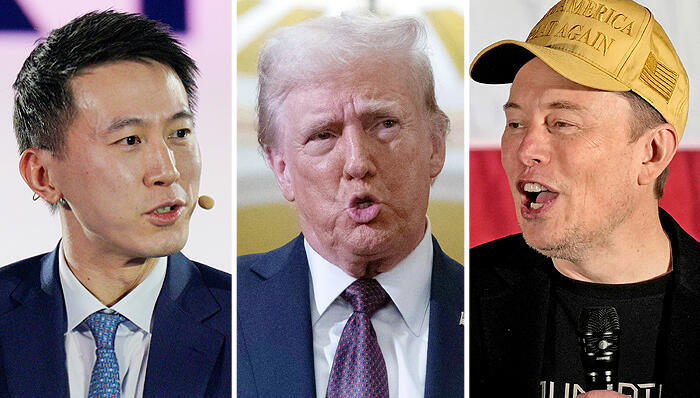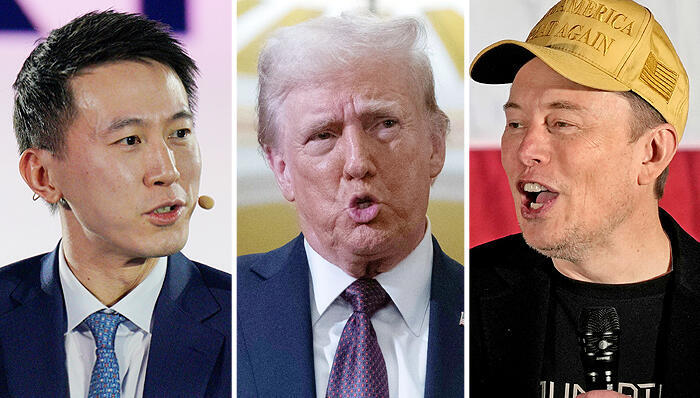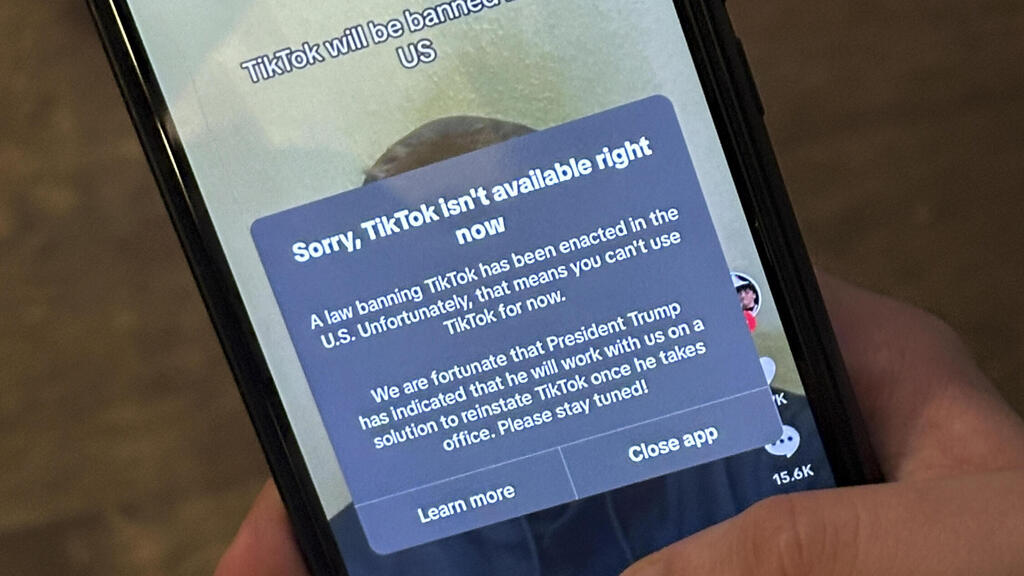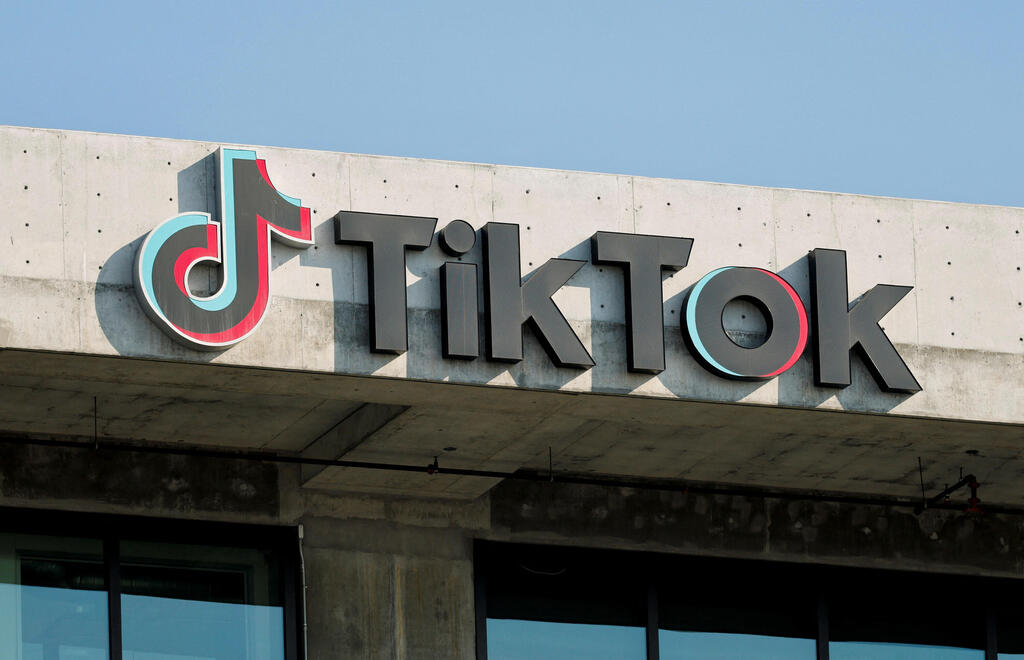
Analysis
TikTok's US shutdown: a high-stakes game of geopolitical chess
As the app goes dark, Trump and Xi weigh diplomatic moves for a resolution.
"Sorry, TikTok isn’t available right now." This was the message displayed to all 170 million TikTok users in the U.S. on Sunday when they attempted to log into the app to create or view videos. TikTok went dark for all users in the U.S.—not because it was required to, but as a pressure tactic directed at the Trump administration, which was sworn on Monday.
There was some good news for users later in the day: Trump announced he would sign a presidential order to temporarily allow TikTok to resume operations. Minutes after his statement, TikTok ended the blackout. "I’m asking companies not to let TikTok stay dark!" Trump wrote on his social network, Truth Social. " I will issue an executive order on Monday to extend the period of time before the law’s prohibitions take effect, so that we can make a deal to protect our national security. The order will also confirm that there will be no liability for any company that helped keep TikTok from going dark before my order."
3 View gallery


Xu Zi, Trump, Musk
(Photos: AP/Matt Rourke, AP/Jose Luis Magana, Bryan van der Beek/Bloomberg)
TikTok voluntarily shut down its app in the U.S. after the enforcement of a law requiring the company to sell its U.S. operations. If it failed to comply, Apple and Google would be obligated to remove TikTok from their app stores, and cloud service providers like Oracle would be prohibited from providing infrastructure to the app.
On Friday afternoon, the U.S. Supreme Court unanimously rejected TikTok's petition to block the law, and the Biden administration refused to explicitly commit to not enforcing the legislation during the final hours of its term. The responsibility has now shifted to incoming President Donald Trump, who has expressed his intention to find a solution allowing TikTok to continue operating, at least temporarily, during his first hours in office.
Concerns about TikTok's operations in the U.S. originated during Trump’s first term in office (2017–2021). Toward the end of his term, he issued a presidential order to ban the app, but the move was ultimately overturned by the Supreme Court. TikTok, owned by the Chinese company ByteDance, has long been viewed by U.S. authorities as a potential national security threat, with concerns that Beijing could use the app to access sensitive information about U.S. citizens or disseminate pro-China propaganda. Much of the evidence presented by the administration during congressional hearings remains classified. However, lawmakers who were initially skeptical said they fully supported the legislation after viewing classified FBI materials.
The current saga began in April, when Congress passed, and President Biden signed, a law mandating TikTok to sell its U.S. operations within 270 days. Failing that, Apple and Google would be required to remove TikTok from U.S. app stores, and cloud providers like Oracle would be barred from hosting its data in U.S. facilities. The law also imposes a $5,000 fine for every individual violation, meaning with 170 million U.S. users, even a single violation could result in a staggering $850 billion in fines—an amount no company, not even Apple, could afford to ignore. However, the law does not require internet service providers to block access to TikTok.
TikTok challenged the law, arguing that it violated the First Amendment. Last Friday, the US Supreme Court rejected TikTok’s appeal, affirming a federal appeals court’s decision from December. "There is no doubt that, for more than 170 million Americans, TikTok offers a distinctive and expansive outlet for expression, means of engagement, and source of community," the Supreme Court said. "But Congress has determined that divestiture is necessary to address its well-supported national security concerns regarding TikTok's data collection practices and relationship with a foreign adversary." With this ruling, TikTok has effectively exhausted all legal avenues in its fight against the legislation.
Interestingly, the law’s wording allows TikTok to continue operating in the U.S. in a limited capacity, even after it takes effect. The legislation does not require internet providers to block access to TikTok, and removing the app from stores does not remove it from devices where it is already installed. Additionally, TikTok could theoretically continue operating by using cloud services located outside the U.S., though this would result in slower response times.
So why did TikTok choose to black out its service in the US?
The Biden administration’s Justice Department had indicated that the ban would be rolled out “over time,” implying it would not be enforced immediately. However, TikTok stated this assurance was insufficient. "The statements issued today by both the Biden White House and the Department of Justice have failed to provide the necessary clarity and assurance to the service providers that are integral to maintaining TikTok's availability to over 170 million Americans," read a TikTok statement.
"Unless the Biden Administration immediately provides a definitive statement to satisfy the most critical service providers assuring non-enforcement, unfortunately TikTok will be forced to go dark on January 19."
TikTok's move is designed to pressure Trump, who has become an avid TikTok fan in recent months due to his successful activity on the platform during the election campaign. However, the decision is not without financial risks. While TikTok does not release official data on its global user base, estimates suggest that U.S. users account for approximately 10% of its worldwide audience. In 2024, the company’s advertising revenue is estimated at $18.5 to $23.58 billion, with U.S. users contributing disproportionately to that revenue. This means that every day of blackout in the U.S. costs the company several million dollars, not to mention the cumulative impact of losing users and advertisers.
Trump has several options to address the situation. First, he could approach Congress and request new legislation to repeal the law. However, this would be a challenging process, as the law was passed with a bipartisan majority despite Trump’s strong opposition.
Another potential solution could involve a "sham" sale or a creative workaround. According to the law, the president has the authority to determine whether ByteDance has relinquished control of TikTok after an internal government review. ByteDance could theoretically transfer control to a new entity, such as an American shell company, or sell shares to a U.S. firm. Trump could then declare that the new arrangement complies with the law, thereby negating the need to block TikTok.
On Sunday, Trump proposed a solution that does not require a full separation of ByteDance from TikTok: transferring the app to joint ownership, with the U.S. or an American company holding a 50% stake. "This way, we save TikTok, keep it in good hands, and allow it to continue operating," Trump said. "Without U.S. approval, there is no TikTok. With our approval, it’s worth hundreds of billions of dollars, maybe even trillions. My initial thought is a joint venture between the current owner and/or new owners, where the U.S. has a 50% stake in the newly established entity."
What about a full sale of TikTok to an American company? This option is widely considered unfeasible, as Beijing has prohibited the transfer of control over TikTok’s algorithm to a non-Chinese entity. The algorithm, often referred to as TikTok’s “secret sauce,” has been a key factor in its rapid user growth. It is capable of quickly analyzing user preferences and delivering highly relevant content.
However, questions remain about the algorithm’s true importance to TikTok’s continued success. Competing platforms like Google’s YouTube Shorts and Meta’s Reels have their own recommendation algorithms, even if they are less effective. Is TikTok’s algorithm several magnitudes better than its competitors'? Could companies with sufficient resources and expertise narrow the gap? It’s also possible that TikTok’s success is less about its algorithm and more about the content and creators on the platform. TikTok may have attracted a more creative and talented user base, along with networks of followers and influencers, which help generate highly engaging and relevant content.
China does not prohibit the sale of TikTok without its algorithm. The app’s value could still lie in its user experience, content, and established community of creators. These elements, built over years, might outweigh the significance of the algorithm. An American company could potentially acquire TikTok without its algorithm and replace it with its own. While the results might not immediately match TikTok’s original performance, they could be sufficient for users, and with time, the alternative algorithm could reach parity with TikTok’s.
Several companies have expressed interest in acquiring TikTok, including artificial intelligence firm Perplexity AI. However, the challenge lies on the selling side. Ultimately, the decision rests with Chinese President Xi Jinping, who will weigh a range of geopolitical considerations. His decision could impact the broader trade war between China and the U.S.
The final resolution of TikTok’s fate may depend less on business considerations, such as price or terms, and more on diplomatic negotiations between Trump and Xi. This raises the question of whether Trump would be willing to invest significant diplomatic and political resources to save TikTok, especially if it involves concessions in the trade conflict with China.
A possible buyer: Elon Musk
One potential buyer, whose involvement could satisfy all parties, is Elon Musk. Reports suggest that Beijing is exploring the possibility of Musk, the world’s richest man and owner of X, acquiring control of TikTok’s US operations. Musk is one of Trump’s closest allies and enjoys his trust. For Trump, placing TikTok under Musk’s control—allowing him to implement changes similar to those made at X—would be welcome news.
From Musk’s perspective, acquiring TikTok would allow him to challenge his rival, Mark Zuckerberg, while expanding his social media empire. Beijing may also favor Musk as an acquirer, given Tesla’s extensive operations in China, including manufacturing plants, a vast charging network, and significant sales activity. These factors give China leverage over Musk to protect its interests. This scenario could represent a win-win for most parties involved.
However, TikTok has strongly denied these reports, calling them "pure fiction." Additionally, Musk and his partners in the X acquisition have faced substantial financial losses from that deal, raising doubts about whether Musk could secure the capital needed for another large-scale acquisition.















